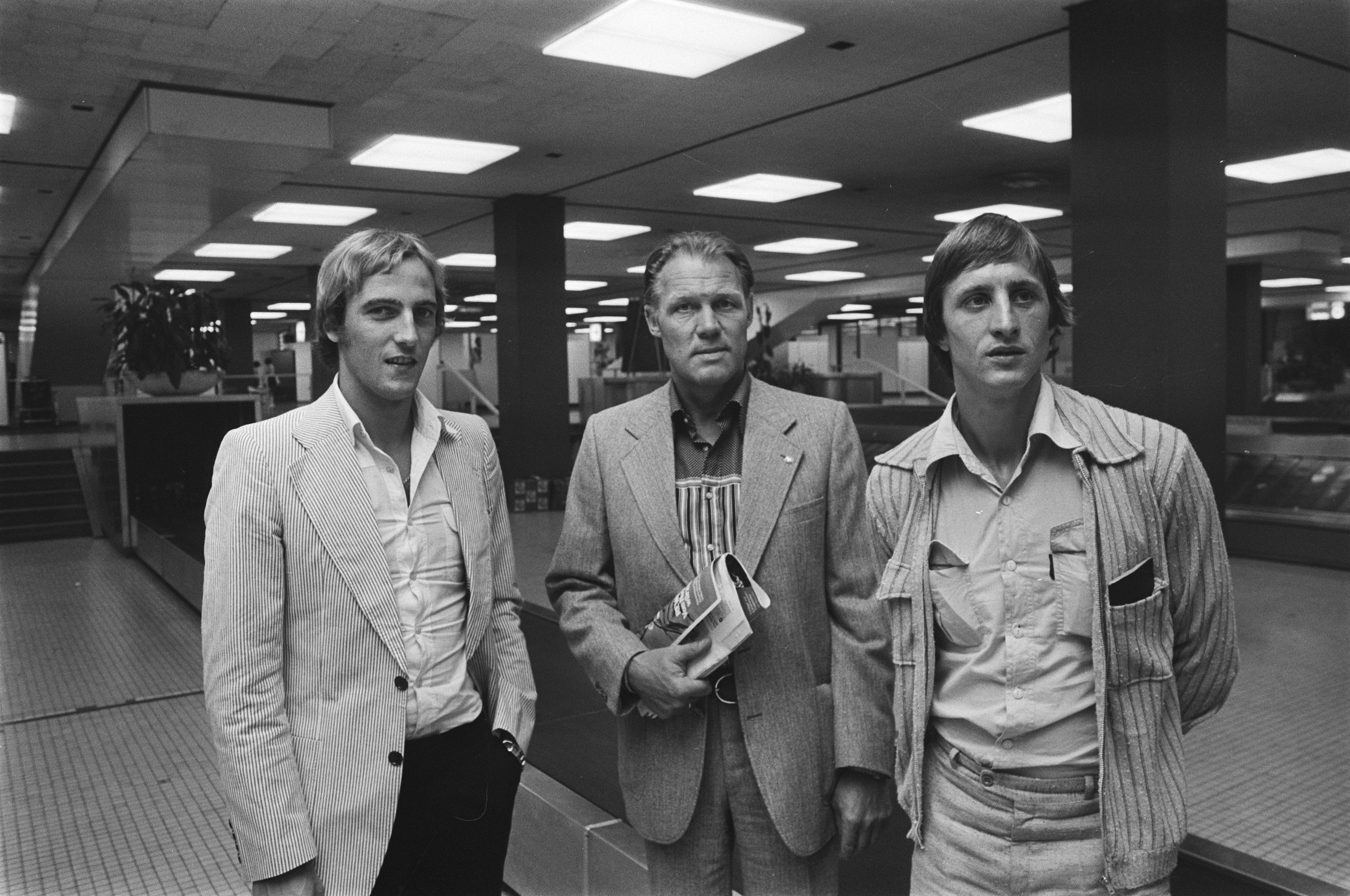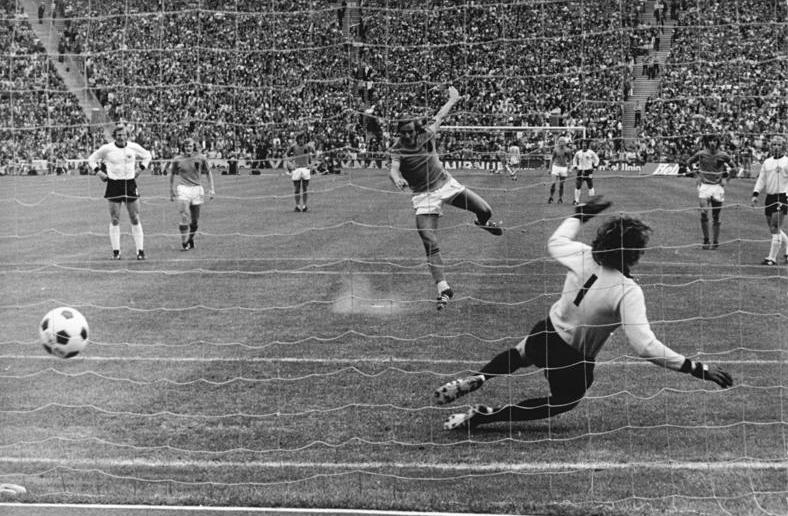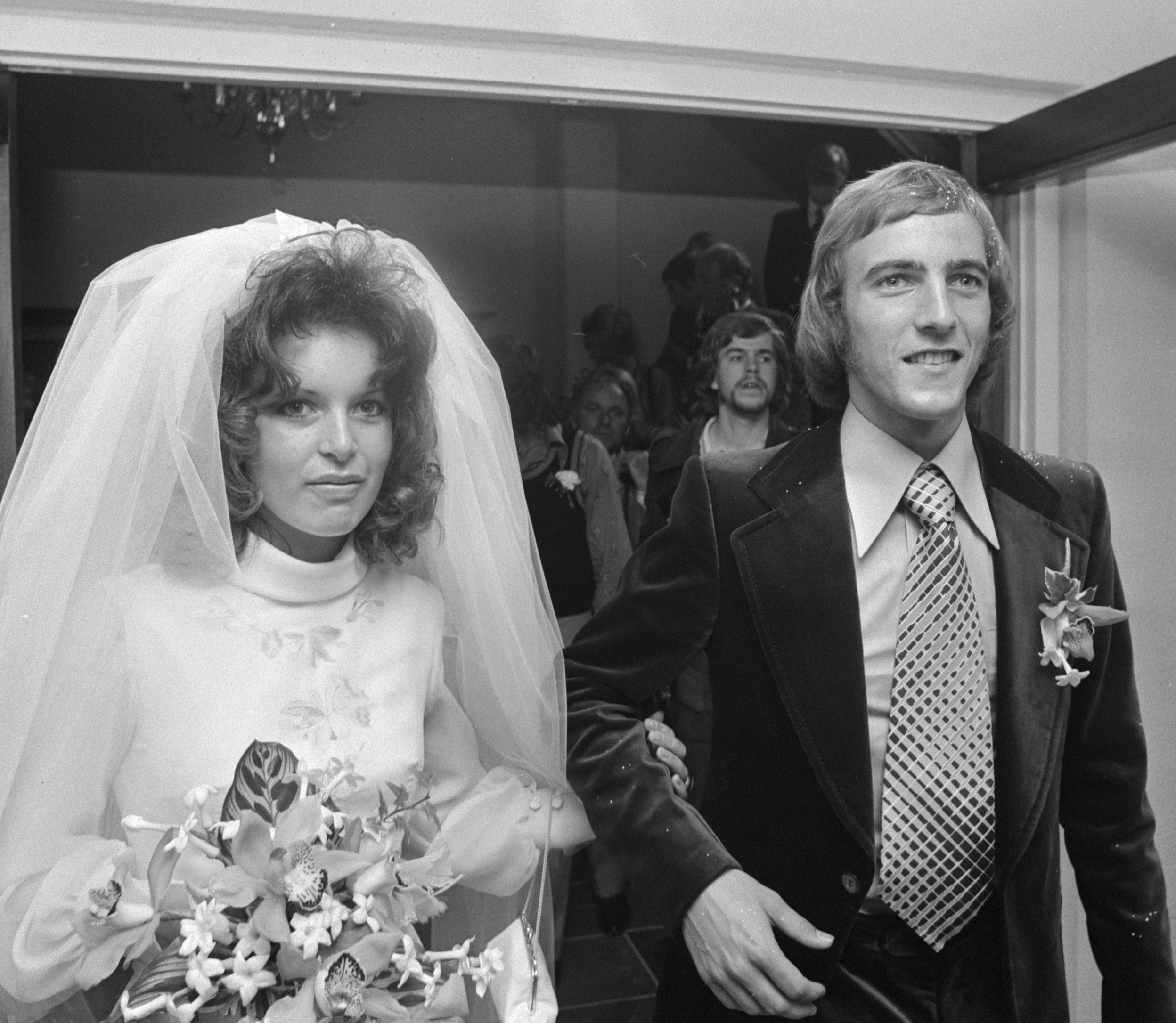1. Early Life
Neeskens was born in Heemstede, North Holland, on 15 September 1951. His childhood was notably affected by his parents' divorce, and he often had to sleep in a corridor due to limited space in their home.
From a young age, Neeskens displayed exceptional talent in various sports, including gymnastics and baseball. He even represented the Netherlands at a youth European Championship in baseball, demonstrating his versatility and athletic prowess beyond football.
2. Playing Career
Johan Neeskens enjoyed an illustrious playing career, making a profound impact at both club and international levels, characterized by his adaptability and relentless work rate.
2.1. Club Career
Neeskens began his professional football journey at Racing Club Heemstede in 1968. His talent quickly caught the eye of legendary manager Rinus Michels, who signed him for Ajax in 1970. Initially, Neeskens played as a right-back, notably featuring in that position for Ajax's victory in the 1971 European Cup Final against Panathinaikos. During the 1971-72 season, he transitioned into a more central midfielder role, providing crucial support to Johan Cruyff. He adapted seamlessly to this new position, thanks to his tireless running, excellent technical skills, and ability to score goals. Ajax achieved remarkable success during this period, completing a historic hat-trick of European Cup wins between 1971 and 1973.
In 1974, Neeskens followed Cruyff and Michels to FC Barcelona. There, he earned the nickname Johan Segon (Johan SegonJohan the SecondCatalan), acknowledging his importance alongside Cruyff. While his time at Barcelona was not as laden with trophies as his spell at Ajax, he did secure a Copa del Rey title in 1978 and the Cup Winners' Cup in 1979. Despite the relatively fewer team accolades, Neeskens remained immensely popular among the Barcelona faithful due to his committed performances and combative style.
In 1979, Neeskens accepted an offer from the New York Cosmos in the NASL, where he spent five years. At the Cosmos, he earned a substantial salary, equivalent to 600.00 K NLG (roughly 300.00 K USD) per year. He played alongside football greats like Franz Beckenbauer and contributed to the Cosmos winning the NASL championships in 1980 and 1982. However, his tenure was not without challenges; he received a nine-month suspension in late 1980 from manager Hennes Weisweiler due to unexcused absences. The Cosmos released him in October 1984.
Following his time in the NASL, Neeskens played for FC Groningen during the 1984-85 season. In June 1985, he signed with the South Florida Sun of the United Soccer League, though the league folded after just six games of the 1985 season. On 15 August 1985, he joined the Kansas City Comets in the Major Indoor Soccer League. Neeskens concluded his playing career in Switzerland, featuring for FC Baar from 1988 to 1990 and FC Zug in the 1990-91 season, before finally retiring in 1991.
2.2. International Career


Neeskens was a vital component of the Netherlands national team, earning 49 caps and scoring 17 goals. He made his international debut against East Germany in 1970.
He played a crucial central midfield role in both the 1974 FIFA World Cup and 1978 FIFA World Cup campaigns. In the 1974 World Cup qualification, Neeskens famously scored a hat-trick in a dominant 9-0 victory over Norway. He also effectively neutralized the attacking threat of Paul Van Himst in a match against Belgium, though his performance was criticized in the Dutch newspaper de Volkskrant for committing 13 fouls.
At the 1974 World Cup in West Germany, Neeskens demonstrated his scoring prowess by converting two penalties against Bulgaria. He also scored a crucial goal in a 2-0 win over reigning champions Brazil, which propelled the Netherlands into the final. In the 1974 FIFA World Cup Final against West Germany, Neeskens made an immediate impact, scoring the opening goal from a penalty kick just two minutes into the match.
Four years later, Neeskens was again a central figure for the Netherlands at the 1978 World Cup in Argentina, especially in the absence of Cruyff, who had retired from international football in 1977. Despite suffering a rib injury during the defeat to Scotland in the group stage, Neeskens continued to play a pivotal role. The Netherlands once more reached the final, but ultimately lost to the host nation, Argentina, with a score of 3-1 after extra time, following a 1-1 draw at the end of regulation.
After his move to the New York Cosmos, Neeskens' international appearances became less frequent. He notably declined to participate in a key UEFA Euro 1980 qualifier against East Germany in November 1979, citing physical and emotional exhaustion. Following the lifting of his nine-month club ban, he was recalled to the national squad by manager Kees Rijvers in late 1981 for two qualifiers for the 1982 FIFA World Cup. He was met with cheers in a 3-0 home victory over Belgium. However, his final international game saw the team lose 2-0 away to France, resulting in the Netherlands missing out on the final tournament.
3. Coaching Career
After retiring as a player in 1991, Neeskens transitioned into coaching, initially managing Swiss clubs FC Zug (1991-1993), Stäfa (1993-1995), and Singen (1995-1996).
In 1995, Guus Hiddink appointed Neeskens as his assistant coach for the Netherlands. They jointly led the team at the 1998 FIFA World Cup. Neeskens continued in this role under Hiddink's successor, Frank Rijkaard, as the Netherlands co-hosted UEFA Euro 2000.
In 2000, Neeskens took on his first head coaching role with Dutch side NEC Nijmegen. He guided them to their first European appearance in twenty years in 2003. However, he was dismissed in December 2004 when the team was in 14th place in the league table.
In December 2005, Neeskens reunited with Guus Hiddink, who requested him to become the assistant coach for the Australia national team, known as the Socceroos. He worked alongside Hiddink and Graham Arnold during Australia's 2006 FIFA World Cup campaign. Football Australia had hoped for Neeskens to succeed Hiddink, who was bound for the Russia national team after the tournament.
Following the 2006 World Cup, Neeskens returned to FC Barcelona to join the club's technical staff, replacing Henk ten Cate and once again reuniting with Frank Rijkaard. However, in May 2008, Rijkaard was dismissed after Barcelona finished third in La Liga for two consecutive seasons, and Neeskens, along with fellow assistant Eusebio Sacristán, departed with him.
Neeskens continued his collaboration with Frank Rijkaard, joining him as assistant manager at Galatasaray in 2009. Their tenure there concluded in October 2010 when both left the club. In 2011, Neeskens became the head coach of the South African club Mamelodi Sundowns. His time there ended in December 2012 when he was sacked, with the team second from bottom after 12 games and having lost the League Cup final to Bloemfontein Celtic.
4. Playing Style
Johan Neeskens was renowned for his distinctive and highly effective playing style as a midfielder. He was often described as a "steel-hard midfielder" due to his immense physical presence and tenacity. Neeskens was a tireless runner, possessing incredible stamina that allowed him to cover vast areas of the pitch, making him an archetypal box-to-box midfielder. His former teammate Sjaak Swart famously remarked that Neeskens "was worth two men in midfield."
Beyond his exceptional work rate, Neeskens also possessed impressive technical skills and a powerful shot, making him a significant goal threat. He was also a specialist in penalty kicks. His strong lower body contributed to the ferocity of his shots. Neeskens excelled at pressuring opponents to regain possession, embodying the high-pressing tactics of the "Total Football" system.
He began his career as a right-back at Heemstede, but it was at Ajax, under manager Ștefan Kovács, that he was moved into central midfield. This positional shift allowed him to flourish within the Total Football framework designed by Kovács's predecessor, Rinus Michels, which emphasized fluid positional changes among players. Interestingly, Neeskens was also an accomplished baseball player in his youth, and he is said to have learned his characteristic sliding tackles from his experience in baseball.
5. Personal Life

Johan Neeskens was married twice during his lifetime. His first marriage was to Marianne Schiphof in 1974, with whom he had one son. In 1985, he married Marlis von Reding, who was Swiss-born. Together, they had two daughters and one son. It is worth noting that John Neeskens, a Dutch footballer who also played in Spain, was incorrectly assumed to be Johan Neeskens' son. Johan Neeskens was also of Jewish heritage.
6. Death
Johan Neeskens died on 6 October 2024, at the age of 73, while in Algeria. He was in the country as part of a coaching project organized by the KNVB (Koninklijke Nederlandse Voetbalbond). His death was attributed to a heart attack.
7. Honours
7.1. Club Honours
Ajax
- Eredivisie: 1971-72, 1972-73
- KNVB Cup: 1970-71, 1971-72
- European Cup: 1970-71, 1971-72, 1972-73
- Intercontinental Cup: 1972
- UEFA Super Cup: 1972, 1973
Barcelona
- Copa del Rey: 1977-78
- European Cup Winners' Cup: 1978-79
New York Cosmos
- North American Soccer League: 1980, 1982
7.2. International Honours
Netherlands
- FIFA World Cup runner-up: 1974, 1978
- UEFA European Championship third place: 1976
- Tournoi de Paris: 1978
7.3. Individual Honours
- FUWO European Team of the Season: 1972
- Sport Ideal European XI: 1974, 1975
- 1974 FIFA World Cup Silver Boot
- 1974 FIFA World Cup All-Star Team
- Don Balón Award (La Liga Foreign Player of the Year): 1975-76
- Mundo Deportivo La Liga Team of The Year: 1976, 1977, 1979
- FIFA 100
- Ballon d'Or Dream Team (Bronze): 2020
- World Soccer magazine's 100 Greatest Players of the 20th Century: 72nd place
8. Career Statistics
8.1. Club
| Club | Season | League | National cup | League cup | Continental | Other | Total | |||||||||||||||||
|---|---|---|---|---|---|---|---|---|---|---|---|---|---|---|---|---|---|---|---|---|---|---|---|---|
| Division | Apps | Goals | Apps | Goals | Apps | Goals | Apps | Goals | Apps | Goals | Apps | Goals | ||||||||||||
| RCH | 1968-69 | Eerste Divisie | 34 | 0 | 1 | 0 | - | - | - | 35 | 0 | |||||||||||||
| 1969-70 | Eerste Divisie | 34 | 1 | 1 | 0 | - | - | - | 35 | 1 | ||||||||||||||
| Total | 68 | 1 | 2 | 0 | 0 | 0 | 0 | 0 | 0 | 0 | 70 | 1 | ||||||||||||
| Ajax | 1970-71 | Eredivisie | 33 | 1 | 6 | 2 | - | 9 | 2 | - | 48 | 5 | ||||||||||||
| 1971-72 | Eredivisie | 28 | 10 | 5 | 2 | - | 8 | 0 | - | 41 | 12 | |||||||||||||
| 1972-73 | Eredivisie | 32 | 7 | 1 | 0 | - | 7 | 0 | 3 | 1 | 43 | 8 | ||||||||||||
| 1973-74 | Eredivisie | 31 | 14 | 4 | 0 | - | 2 | 0 | 2 | 1 | 37 | 15 | ||||||||||||
| Total | 124 | 32 | 16 | 4 | 0 | 0 | 24 | 2 | 5 | 2 | 169 | 40 | ||||||||||||
| Barcelona | 1974-75 | La Liga | 27 | 7 | 0 | 0 | - | 7 | 1 | - | 34 | 8 | ||||||||||||
| 1975-76 | La Liga | 32 | 12 | 0 | 0 | - | 9 | 6 | - | 41 | 18 | |||||||||||||
| 1976-77 | La Liga | 33 | 8 | 0 | 0 | - | 8 | 1 | - | 41 | 9 | |||||||||||||
| 1977-78 | La Liga | 18 | 2 | 2 | 0 | - | 7 | 1 | - | 27 | 3 | |||||||||||||
| 1978-79 | La Liga | 30 | 6 | 1 | 0 | - | 9 | 0 | - | 40 | 6 | |||||||||||||
| Total | 140 | 35 | 3 | 0 | 0 | 0 | 40 | 9 | 0 | 0 | 183 | 44 | ||||||||||||
| New York Cosmos | 1979 | NASL | 13 | 4 | 13 | 4 | ||||||||||||||||||
| 1980 | NASL | 17 | 4 | 17 | 4 | |||||||||||||||||||
| 1981 | NASL | 6 | 2 | 6 | 2 | |||||||||||||||||||
| 1982 | NASL | 17 | 0 | 17 | 0 | |||||||||||||||||||
| 1983 | NASL | 23 | 2 | 23 | 2 | |||||||||||||||||||
| 1984 | NASL | 18 | 5 | 18 | 5 | |||||||||||||||||||
| Total | 94 | 17 | 0 | 0 | 0 | 0 | 0 | 0 | 0 | 0 | 94 | 17 | ||||||||||||
| Groningen | 1984-85 | Eredivisie | 7 | 0 | 0 | 0 | - | 0 | 0 | - | 7 | 0 | ||||||||||||
| South Florida Sun | 1985 | USL | 1 | 1 | 1 | 1 | ||||||||||||||||||
| Kansas City Comets | 1985-86 | MISL | 23 | 1 | 23 | 1 | ||||||||||||||||||
| Löwenbrau | 1986-87 | |||||||||||||||||||||||
| Baar | 1987-88 | 9 | 1 | 9 | 1 | |||||||||||||||||||
| 1988-89 | 13 | 4 | 13 | 4 | ||||||||||||||||||||
| 1989-90 | 1 | 0 | 1 | 0 | ||||||||||||||||||||
| Total | 23 | 5 | 0 | 0 | 0 | 0 | 0 | 0 | 0 | 0 | 23 | 5 | ||||||||||||
| Zug | 1990-91 | 1 | 0 | 1 | 0 | |||||||||||||||||||
| Career total | 457 | 91 | 21 | 4 | 0 | 0 | 64 | 11 | 5 | 2 | 547 | 108 | ||||||||||||
8.2. International
| National team | Year | Apps | Goals |
|---|---|---|---|
| Netherlands | 1970 | 2 | 0 |
| 1971 | 3 | 0 | |
| 1972 | 4 | 5 | |
| 1973 | 5 | 1 | |
| 1974 | 13 | 9 | |
| 1975 | 3 | 1 | |
| 1976 | 4 | 1 | |
| 1977 | 3 | 0 | |
| 1978 | 8 | 0 | |
| 1979 | 2 | 0 | |
| 1980 | 0 | 0 | |
| 1981 | 2 | 0 | |
| Total | 49 | 17 | |